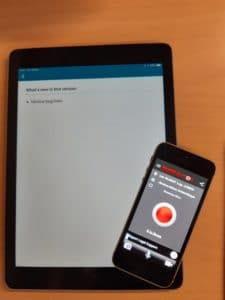There are so many Apps being developed all the time; to make everyday life easier to manage and promote independence and safety at home and when out and about. The ILC Therapists have searched for some that we think could be helpful and you can read about them here. This is not an exhaustive list. These Apps are produced and maintained by third parties and are included as information, not as a recommendation. See our Apps disclaimer.
View our app suggestions below for staying safe at home and when out and about:

Red panic button by Ultimate communication software Ltd: The application enables users to push a central button on their phone screen to allow immediate contact with a carer, friend, or family member who can respond or contact the emergency services, with details of your location. Pros: Allows for quick SOS email/text/social media link when the user needs help. Cons: Can reduce battery life even when not in use, as it is always tracking your location. Apple or Android. Version: 1.4.109. Storage Space: 21.1MB. Cost: £4.99
My SOS family by my SOS Ltd: SOS alert app works when the user presses and holds the ‘help me’ button in the app, it sends an automated help text, email, or call to the nominated person/s number with a link to the user’s Google map location. There is an option for the person to add text or photo with a reason for needing help. The app can also be opened and help requested through a voice-activated virtual assistant (e.g. Alexa) or help activated by a voice trigger phrase within the first minute of opening the app. It also has the facility to set a timer with a custom message, so if the person is unable to cancel because something’s happened (e.g. not returning from the toilet in the expected time due to a fall), SOS alerts are automatically sent when the countdown reaches zero. Pros: The person receiving the notification can reply to take ownership, and the app then notifies other responders that the help request is being dealt with. Cons: The person needs to recognise the need for help and be able to open the app to access the help button. Apple or Android. Version: 3.1 Storage space: 73.3MB, Cost Free 30-day trial then a monthly or yearly subscription £3.49/£33.99.

